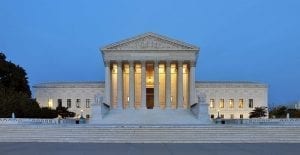As in Alabama, some lawmakers hope appeals will bring them in front of the Supreme Court.
An Arkansas federal judge has issued temporary injunctions against three restrictive abortion laws. Among them, writes National Public Radio, was a requirement that any physicians providing the procedure be board-certified. That alone would’ve likely been enough to close down the state’s only surgical clinic.
However, the series of laws were challenged by the Little Rock Family Planning Services, along with Planned Parenthood. Collectively, they were backed in court by the American Civil Liberties Union.
“It would be extraordinarily damaging to patients’ access to abortion care,” said Lori Williams, clinical director of LRFPS.
The lawsuit sought to end the law mandating certifications, which critics say are medically unnecessary. Under its purview, only board-certified obstetrics and gynecology physicians would be able to perform abortions. But in Arkansas and many other states, the procedures are routinely carried out by family doctors and internal medicine physicians.
“The weight of the evidence demonstrates that there is no medical benefit to this law,” said Meagan Burrows, a staff attorney with the ACLU’s Reproductive Freedom Project.

One was a ban on abortions performed after 18 weeks of pregnancy, while the other prevented expecting mothers from aborting a fetus solely because due to a Down syndrome diagnosis.
Interestingly, the certification law seemed to make sense on paper–
Opponents said the policies could force abortion-seekers out of the state, endangering mothers’ lives in the process.
On Tuesday, U.S. District Judge Kristine Baker granted a 14-day restraining order against the laws.
“Since the record at this stage of the proceedings indicates that Arkansas women seeking abortions face an imminent threat to their constitutional rights, the court concludes that they will suffer irreparable harm without injunctive relief,” Baker wrote.
In a Wednesday statement, Arkansas Attorney General Leslie Rutledge said the lawsuit and restraining order are “frustrating, but not unforeseen.”
“The action was only the initial step and I anticipate further action in the near future in our defense of these laws that protect the life of mothers and their unborn children,” Rutledge said.
While the order expires on August 6th, Vox.com notes that Baker is considering an injunction that could block the rules for even longer.
“The attorneys and particularly all of the providers on the ground and Little Rock Family Planning are just so relieved that this order is in place now,” Burrows said.
The order, though, may have its own long-term goals—and being stopped in a lower court could be one of them.
As Vox.com reports, other states’ restrictive abortion bans were intended to be challenged. In Alabama—which recently passed a law outlawing abortion at any stage of pregnancy, with no exceptions for rape or incest—one of the legislation’s sponsors said he wanted to force a show-down in the Supreme Court.
“What I’m trying to do here is get this case in front of the Supreme Court so Roe v. Wade can be overturned,” said Rep. Terri Collins (R-AL).
Sources
Federal Judge Temporarily Blocks Arkansas Abortion Restrictions
Why this law could be a bigger threat to Roe v. Wade than near-total abortion bans


Join the conversation!